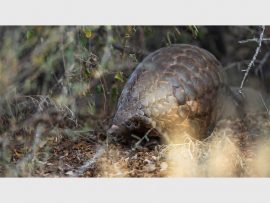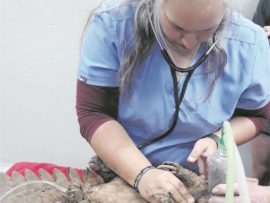Rescued pangolin gives birth to pup in the wild
GLENFERNESS – This is the first record of an African pangolin giving birth after being successfully retrieved out of the illegal wildlife trade and being released back into the wild.

The Johannesburg Wildlife Veterinary Hospital (JWVH) were excited to be part of the first recorded African pangolin giving birth after being retrieved out of the illegal wildlife trade and then released back into the wild.
The hospital explained that on 25 April, a pangolin was rescued from the illegal trade by an intelligence-driven operation led by the SAPS Endangered Wildlife Species Unit.
Pangolins rescued from the trade are given names of association with their retrieval location or circumstances. In the case of this pangolin, she was named Ally, derived from her rescue location in the Alldays region of Limpopo.
Ally was transported to Dr Xander de Kock, a veterinary surgeon in Polokwane. Dr de Kock contacted Dr Karin Lourens from the JWVH to assist because of her vast experience with Temminck’s pangolins.
Ally was found to be dehydrated and underweight. During an abdominal ultrasound, she was also found to be pregnant, making her treatment even more urgent.
Pregnant pangolins are rarely seen by researchers and vets, meaning that there are no studies on the stages of development of pangolin foetuses.
Doctors therefore had no way of determining the age of the foetus, but they were able to detect a normal, regular heartbeat.
Dr Lourens transported Ally back to a secure location in Johannesburg, where she was found to be suffering from pneumonia.
Wildlife rehabilitation specialist at the hospital Dr Nicci Wright said, “The news of her pregnancy was both happy and sad for the staff at the hospital as a new life is always wonderful, but the risk of Ally aborting due to stress was great.”
She was slowly nursed back to health with regular blood tests, CT scans to ensure that her lungs were healing and ultrasounds to ensure the pup was developing normally.
After a few weeks, Ally became more confident and started behaving more normally. She also gained significant weight, enabling Dr Lourens to clear her for release.
Ally was discharged on 13 May to a secure location. She was fitted with transmitters to ensure efficient post-release monitoring. “Initially her release had us worried, as she was displaying possible stress behaviour and we were worried that she might not adapt and settle to the selected release site. Our main concern was the ‘fleeing’ out of the area, which would be an indication of an extremely stressed animal,” said Wright.
“Upon observing her behaviour and taking frequent body weight readings, we actually found the opposite.”
Ally was maintaining a constant weight, but her movement indicated that she was looking for a more familiar habitat. After careful consideration, she was moved to a different area at the reserve, which proved successful.
Using cameras, the teams were delighted to notice her new-born pup. “This is the first time we have a record of an African pangolin successfully giving birth after being retrieved out of the illegal wildlife trade and being released back into the wild. We are a coalition of proud aunts and uncles, with the first in our history – a new pangolin born free,” said Wright.
The cooperation between JWVH, the African Pangolin Working Group, South African Police Services Endangered Species Unit, Limpopo Department of Economic Development, Environment and Tourism and the Department of Environment, Forestry and Fisheries and private game farm owners made this event possible.







